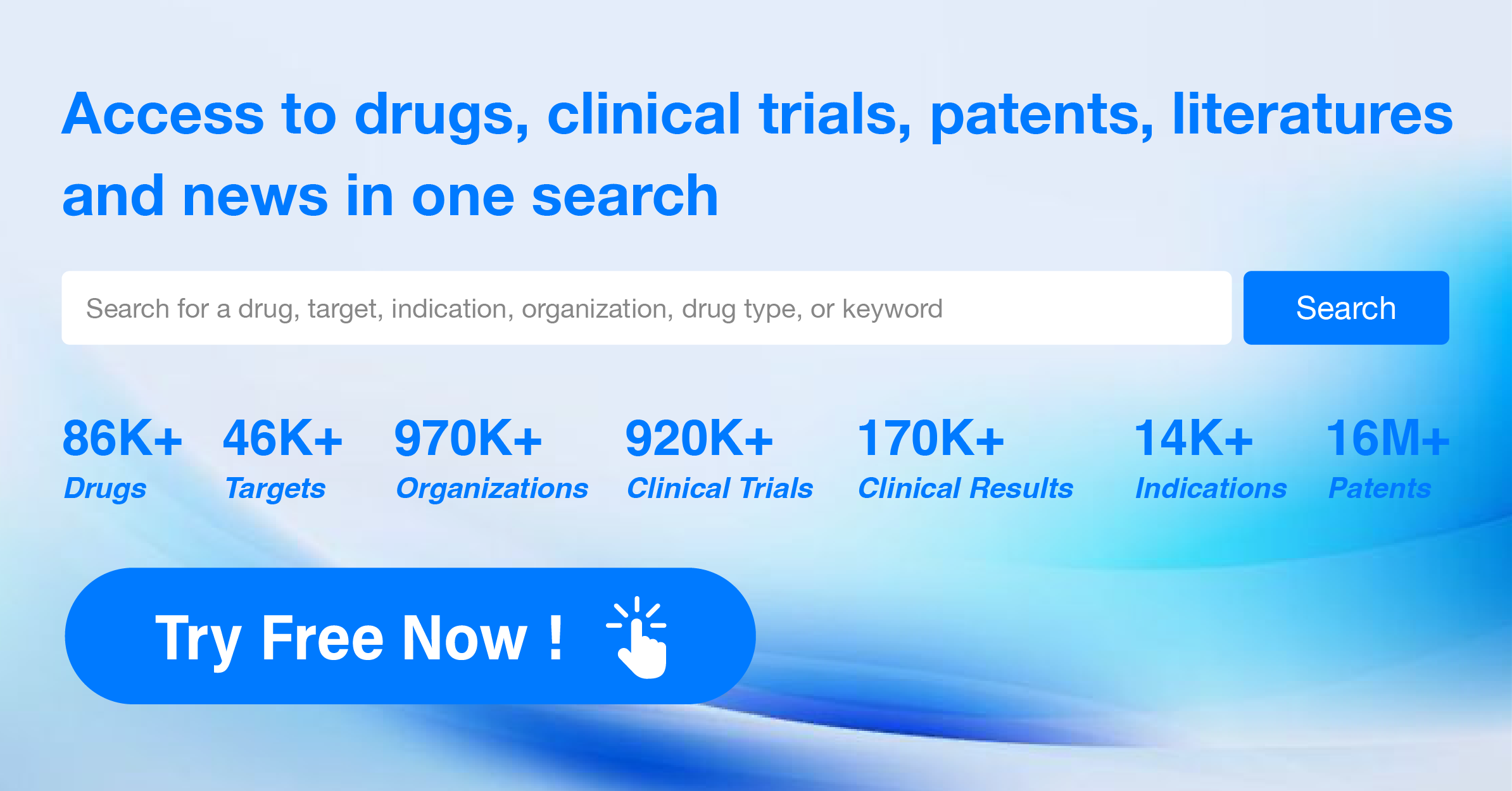Pharma Frontiers: Daily Digest of Global Pharmaceutical News - Jun 12
1.Eisai and Biogen Initiate Rolling Submission for Subcutaneous Alzheimer's Disease Therapy
On June 11th, Eisai and Biogen announced that they have initiated a rolling submission of a Biologics License Application (BLA) to the U.S. FDA for the subcutaneous formulation of Leqembi for the treatment of Alzheimer's disease. The therapy is intended as a weekly maintenance treatment for patients with mild cognitive impairment or mild dementia due to Alzheimer's disease. Concurrently, the U.S. FDA has accepted a supplemental Biologics License Application (sBLA) for once-monthly intravenous infusion of Leqembi as a maintenance therapy for the same patient population. The FDA anticipates completing the review of this sBLA by early next year.
As part of the maintenance treatment regimen, patients who have completed the initial bi-weekly treatment phase with Leqembi will receive once-monthly intravenous infusions to sustain effective drug concentrations, thereby continuously clearing highly toxic fibrillar amyloid-beta (Aβ). Fibrillar Aβ is considered to be the most toxic form of amyloid-beta, capable of causing neuronal damage even after amyloid-beta plaques in the brain have been cleared. This sBLA is based on model analyses of clinical data from the Phase 2 trial (Study 201) and its open-label extension study (OLE), as well as the Clarity AD trial (Study 301) and its OLE study.
2.Ipsen's Small Molecule Drug for Treating Rare Liver Disease, Primary Biliary Cholangitis, Gains FDA Approval!
On June 11, Ipsen announced that the U.S. FDA has granted accelerated approval for Iqirvo (elafibranor) 80mg tablets in combination with ursodeoxycholic acid (UDCA) for the treatment of adult patients with primary biliary cholangitis (PBC) who have had an inadequate response to UDCA, or as monotherapy for patients who are intolerant to UDCA. According to the press release, Iqirvo is the first new drug approved in nearly a decade for the treatment of the rare liver disease PBC. Ipsen has submitted regulatory applications to the European Medicines Agency (EMA) and the Medicines and Healthcare Products Regulatory Agency (MHRA) in the UK, with final regulatory decisions anticipated in the second half of 2024.
PBC is a serious chronic liver disease characterized by chronic damage to the bile ducts, which impairs the liver's ability to clear toxins from the body, leading to cirrhosis and liver failure. Currently, approximately 50% of PBC patients have an inadequate response to existing therapies or are unable to tolerate their side effects, indicating a significant unmet need in this field.
The approval of this therapy is mainly based on positive results from the pivotal Phase 3 ELATIVE trial. The analysis showed a significant treatment benefit in the primary composite endpoint. Specifically, 51% of patients in the 80mg elafibranor group achieved a biochemical response compared to 4% in the placebo group, a difference of 47% (P<0.001). In the trial, a biochemical response was defined as alkaline phosphatase (ALP) < 1.67 times the upper limit of normal (ULN), ALP reduction ≥ 15%, and total bilirubin (TB) ≤ ULN at week 52. ALP and bilirubin are important predictors of PBC disease progression, and their reduction may indicate less cholestatic damage and improved liver function.
Additionally, only patients treated with elafibranor reached normal ALP levels at week 52, including 15% of those in the drug group (P=0.002), which was a key secondary endpoint of the trial. Elafibranor also demonstrated a significant biochemical effect by reducing ALP levels rapidly from baseline. The elafibranor group showed a decrease in ALP levels as early as week 4, sustained through week 52, with a 41% greater reduction compared to the placebo group.
3.AstraZeneca Submits New Indication Application for Third-Generation EGFR Inhibitor Osimertinib (Tagrisso) for Lung Cancer in the US
On June 10th, AstraZeneca announced that the supplemental New Drug Application (sNDA) for osimertinib in the treatment of unresectable, EGFR mutation-positive (exon 19 deletions or exon 21 [L858R] mutations), stage III non-small cell lung cancer (NSCLC) patients following chemoradiotherapy (CRT) has been accepted by the FDA and granted priority review. The FDA is expected to make a decision in the fourth quarter of this year. The sNDA submission is primarily based on positive results from the Phase III LAURA study. The results demonstrated a significantly prolonged progression-free survival (PFS) for patients in the osimertinib group compared to the placebo group (39.1 vs. 5.6 months, HR = 0.16, P < 0.001). At 12 months, 74% of patients in the osimertinib group were alive and disease progression-free versus 22% in the placebo group. At 36 months, 84% and 74% of patients in the osimertinib and placebo groups respectively, were alive (HR = 0.81, P = 0.53, with a data maturity of 20%). In terms of safety, grade 3 or higher adverse events occurred in 35% of patients in the osimertinib group compared to 12% in the placebo group. Additionally, 48% of patients in the osimertinib group reported radiation pneumonitis (primarily grades 1-2) as opposed to 38% in the placebo group. No new safety concerns were identified.
Osimertinib, a third-generation EGFR inhibitor developed by AstraZeneca, was first approved in the United States in November 2015. To date, it has been approved for four indications:
·First-line monotherapy for patients with locally advanced or metastatic NSCLC harboring exon 19 deletions or exon 21 (L858R) mutations.
·Treatment of locally advanced or metastatic EGFR T790M mutation-positive NSCLC in patients who have progressed on or after EGFR TKI therapy.
·Adjuvant treatment for patients with NSCLC who have undergone surgical resection and who have exon 19 deletions or exon 21 (L858R) mutations.
·Combination therapy with pemetrexed and platinum-based chemotherapy as a first-line treatment for locally advanced or metastatic NSCLC with exon 19 deletions or exon 21 (L858R) mutations.
4.Ascentage Pharma: Olverembatinib's New Indication Receives Approval for Registration Phase III Clinical Trial
On June 11, Ascentage Pharma announced that the clinical trial application for a new indication of Olverembatinib has been approved by the Center for Drug Evaluation (CDE) of the China National Medical Products Administration (NMPA). The company will initiate a global registration Phase III clinical trial to evaluate the efficacy of Olverembatinib in patients with succinate dehydrogenase (SDH)-deficient gastrointestinal stromal tumors (GIST) who have failed previous systemic therapies. Olverembatinib, an oral third-generation BCR-ABL inhibitor developed by Ascentage Pharma, already has two approved indications: 1) for the treatment of adult patients with chronic phase (CML-CP) or accelerated phase (CML-AP) chronic myeloid leukemia who are resistant to any tyrosine kinase inhibitors (TKIs) and carry the T315I mutation; 2) for the treatment of adult patients with CML-CP who are resistant or intolerant to first- and second-generation TKIs. The commercialization of Olverembatinib in China is jointly managed by Ascentage Pharma and Innovent Biologics.
The current CDE approval pertains to a global, multicenter, single-arm, open-label pivotal Phase III clinical trial, which aims to assess the efficacy and safety of Olverembatinib in patients with SDH-deficient GIST. According to Ascentage Pharma’s press release, the CDE has agreed that the results of this clinical trial can be used to support a future marketing application for the SDH-deficient GIST indication.
GIST is the most common soft tissue sarcoma of the digestive tract. The main oncogenic driver genes for GIST are KIT and PDGFRA, with mutations present in 85%-90% of GIST patients. The advent of TKIs has improved the prognosis for these patients. However, approximately 85% of pediatric GIST and 10%-15% of adult GIST patients do not carry KIT or PDGFRA mutations, known as wild-type GIST. Based on the presence or absence of SDH expression, wild-type GIST can be categorized into SDH-deficient GIST and non-SDH-deficient GIST. Patients with SDH-deficient GIST generally have an early onset, significantly impacting their quality of life and reducing survival time, thus highlighting the urgent need for new treatments.
5.Kangpu Biopharmaceuticals Announces Phase 2a Clinical Data for Molecular Glue Drug in Treatment of Systemic Lupus Erythematosus
On June 11, Kangpu Biopharmaceuticals announced that it will present a poster at the European League Against Rheumatism (EULAR) 2024 annual conference, detailing the Phase 2a clinical trial results for KPG-818 in the treatment of Systemic Lupus Erythematosus (SLE). EULAR 2024 is scheduled to take place from June 12 to 15, 2024, in Vienna, Austria. SLE is a complex, chronic autoimmune disease where the body's immune system attacks its own tissues.
KPG-818 is an orally administered small molecule immunomodulatory drug developed in-house by Kangpu Biopharmaceuticals. It belongs to the category of E3 ubiquitin ligase complex CRL4CRBN modulators and exhibits high affinity for the CRBN target. Consequently, it effectively degrades zinc-finger transcription factors Aiolos (IKZF3) and Ikaros (IKZF1), regulating the expression levels of immune cells (B cells, T cells, and Treg cells) and related cytokines.
Currently, a bridging clinical trial of KPG-818 for SLE is underway in China, and a Phase 1 clinical trial for its application in various hematological malignancies is nearing completion in the United States. The data to be presented at EULAR 2024 originates from a multicenter, randomized, double-blind, placebo-controlled Phase 2a clinical trial conducted in the United States. The trial assesses the safety, tolerability, pharmacokinetics, and preliminary efficacy of KPG-818 in SLE patients, also aiding in dose selection for forthcoming Phase 2b trials.
Eligible participants were randomly assigned in a 1:1:1:1 ratio to receive oral KPG-818 capsules at doses of 0.15 mg, 0.6 mg, 2 mg, or placebo, administered once daily over a 12-week treatment period. Clinical endpoints included changes in SLE disease activity scores such as SLEDAI-2K, CLASI, and PGA from baseline.
The results indicated that the 0.15 mg and 0.6 mg dose groups of KPG-818 demonstrated good safety and tolerability over the 12-week period. Compared to the placebo group, the 0.15 mg dose group showed significant improvements in both SLEDAI-2K and CLASI scores at 12 weeks. KPG-818 also exhibited favorable pharmacokinetic properties, reduced the overall B cell population, and increased Treg cells in SLE patients.
6.Biosion Announces Key Phase 2 Data for New Atopic Dermatitis Drug
On June 11, Biosion announced the presentation of key results from the ADAMANT study in an oral report at the Revolutionizing Atopic Dermatitis (RAD) 2024 conference held in Chicago, USA. The study is a Phase 2 proof-of-concept (POC) clinical trial evaluating bosakitug, a highly potent anti-TSLP monoclonal antibody, for the treatment of patients with atopic dermatitis. Bosakitug (BSI-045B/TQC2731) is a high-affinity humanized monoclonal antibody targeting thymic stromal lymphopoietin (TSLP), a cytokine implicated in the pathogenesis of atopic dermatitis, asthma, and other eosinophilic and Th2 immune-related diseases.
According to the press release, Biosion is conducting a Phase 2 clinical trial for atopic dermatitis in the USA. Its partner, Chia Tai Tianqing, holds development and commercialization rights for this product (development code TQC2731) in Greater China and is conducting a Phase 2 trial in China for severe asthma and chronic rhinosinusitis with nasal polyps.
The trial results presented at the conference demonstrated that all participants received an induction dose of 300 mg weekly for 4 weeks, followed by a maintenance dose of 300 mg every two weeks for a total of 10 doses. After 25 weeks, 94%, 69%, and 25% of participants achieved EASI (Eczema Area and Severity Index) 75, 90, and 100 responses, respectively (indicating ≥75%, 90%, and 100% improvement from baseline in EASI score). Furthermore, 94% of participants achieved an Investigator's Global Assessment (IGA) score of 0/1 (indicating complete or near-complete clearance of lesions). All participants maintained an EASI 75 response for up to 12 weeks following the last dose administration.
7.New Immune Checkpoint Inhibitor: Anti-LILRB1 Antibody Commences Phase 1 Clinical Trial in the U.S.
On June 11, LG Chem announced the formal initiation of a Phase 1 clinical trial for its independently developed anticancer drug “LB-LR1109” in the United States, with participant recruitment already underway. According to LG Chem's press release, LB-LR1109 is an antibody drug targeting LILRB1. The Leukocyte Immunoglobulin-like Receptor Subfamily B (LILRB) is a protein family predominantly expressed in myeloid cells, including members LILRB1 through LILRB5, and a closely related member LAIR1. LG Chem's statement notes that the LILRB1 protein is expressed not only in immune T cells but also on the surfaces of NK (natural killer) cells, macrophages, and other immune cells. Therefore, an antibody targeting LILRB1 differs from checkpoint inhibitors that solely act on single immune cells such as T cells.
LB-LR1109 is a monoclonal antibody drug targeting LILRB1. It aims to disrupt the interaction between the immune checkpoint signaling molecule LILRB1 (present in various immune cells) and the protein HLA-G found in cancer cells, which prevents immune cells from attacking the cancer. Simultaneously, it enhances the overall function of immune cells within the body. In December 2023, LB-LR1109 received FDA approval to conduct clinical trials. The clinical trial launched in the U.S. will also be conducted in South Korea, recruiting patients with primary or metastatic solid tumors to evaluate the safety, tolerability, pharmacokinetics, and pharmacodynamics of LB-LR1109.Furthermore, LG Chem stated in the press release that it would strengthen its collaborative relationship with the anticancer drug development company AVEO to develop strategic plans for subsequent clinical development and regulatory approval.
8.Fulian Pharmaceutical Unveils Preclinical Data for NTSR1-Targeted RDC
On June 11th, Fulian Pharmaceutical, a radiopharmaceutical company, disclosed the preclinical data of its NTSR1-targeted radiotherapeutic drug conjugate (RDC), FL-091, through an oral presentation at the 2024 Society of Nuclear Medicine and Molecular Imaging (SNMMI) Annual Meeting held in Canada. According to the press release, this marks the first time the company has revealed the preclinical research outcomes of this innovative NTSR1-targeted RDC. The radioactive ligand carrier has exhibited favorable biodistribution characteristics and exceptional antitumor activity.
Neurotensin receptor 1 (NTSR1) plays a significant role in the development, metastasis, and prognosis of various malignant tumors, making it one of the frontier targets in cancer treatment. NTSR1 belongs to the family of neurotensin receptors, which function by regulating neurotensin across multiple systems in the human body, including the gastrointestinal system. Studies have shown that the overexpression of NTSR1 is associated with the progression of several cancers, including colorectal, breast, pancreatic, and head and neck cancers.
Publicly available information indicates that FL-091 has demonstrated significantly enhanced NTSR1 binding affinity in preclinical studies. Additionally, its radiotherapeutic drug conjugates (RDCs) with Lutetium-177 and Actinium-225, 177Lu-FL-091, and 225Ac-FL-091 respectively, show markedly improved biodistribution properties, including increased tumor uptake and accelerated clearance from normal tissues. More importantly, these improved biodistribution properties have enabled these RDCs to exhibit outstanding antitumor activity across various tumor xenograft models.




